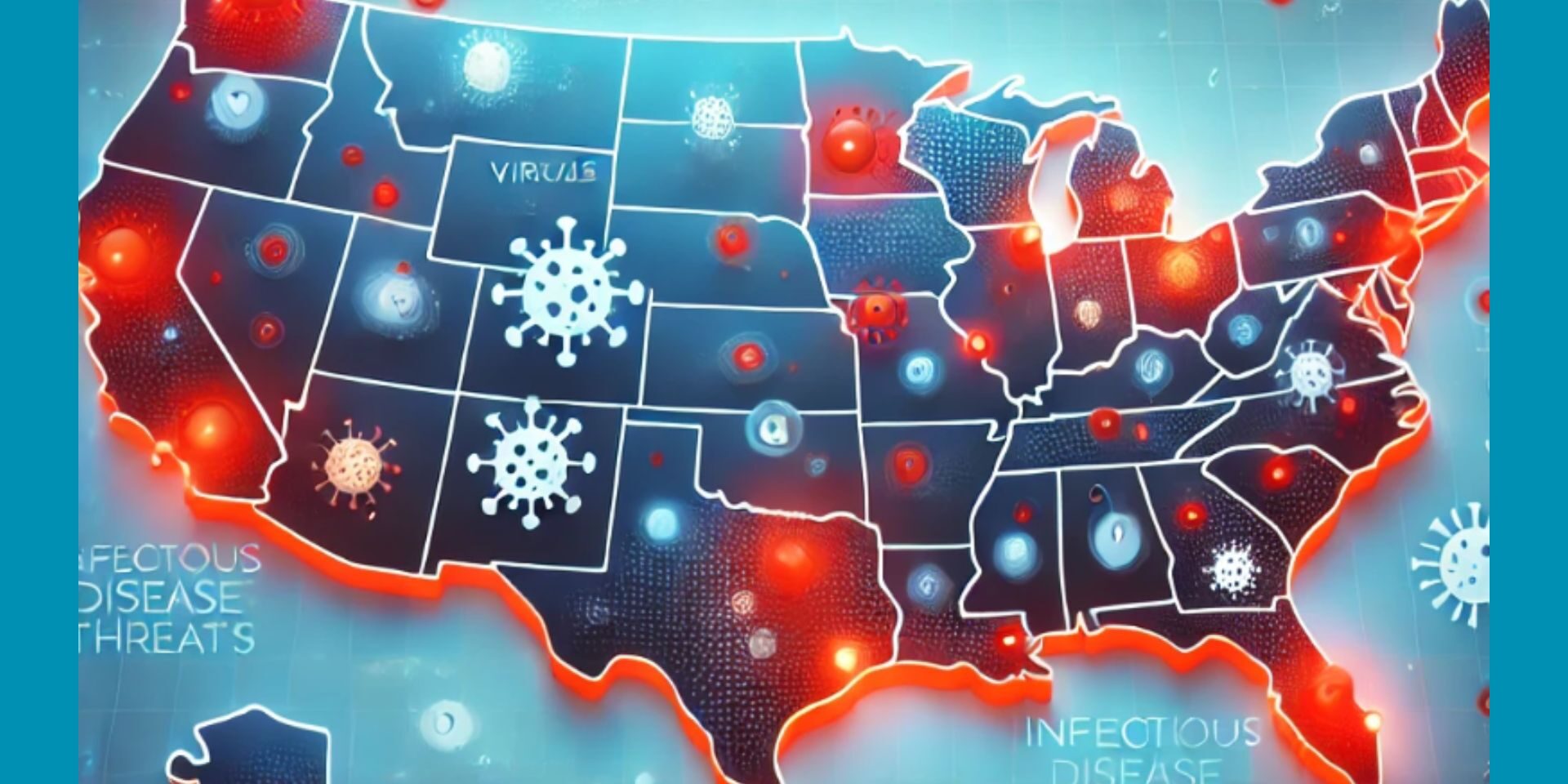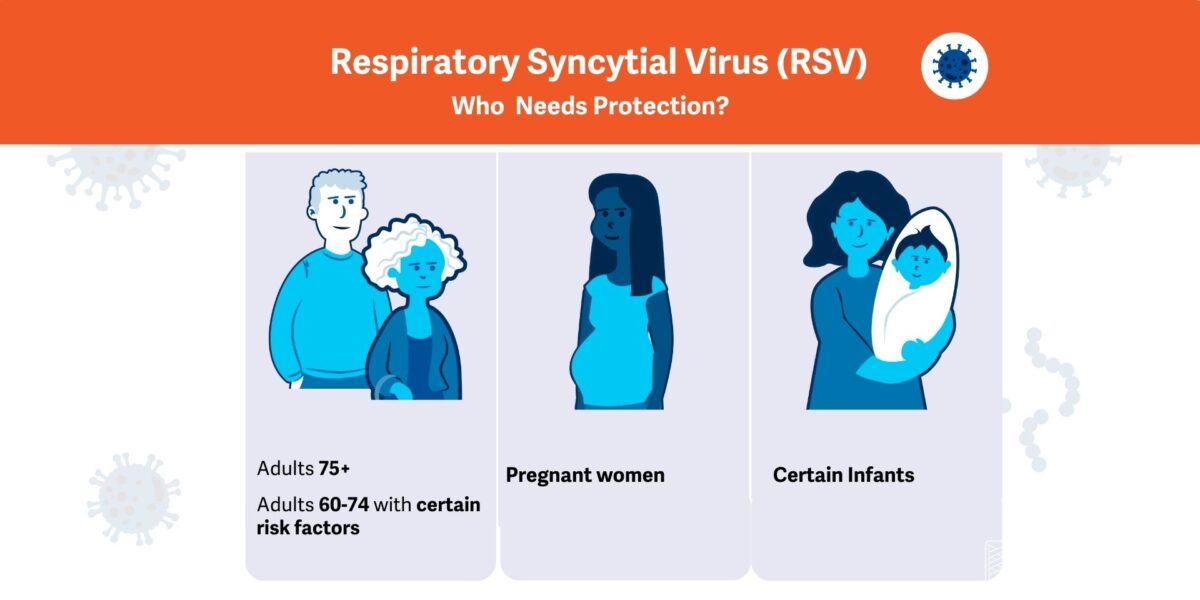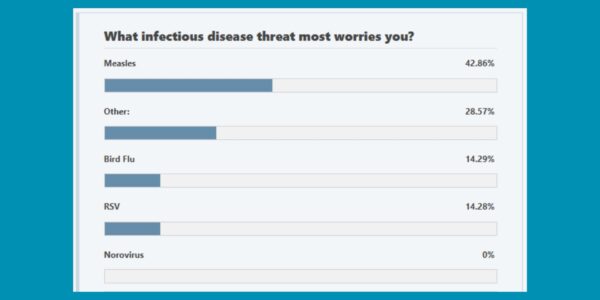
According to poll responses on the National Foundation for Infectious Diseases (NFID) website, there are several worrisome infectious disease threats. Read recent news on topics of greatest concern, including avian influenza (bird flu), measles, and respiratory syncytial virus (RSV) …
Bird Flu
What is Bird Flu? Here’s Everything You Need to Know about the Virus Affecting Chickens and Dairy Cattle: The H5N1 bird flu virus has spread among a variety of bird species, including chickens, ducks, turkeys, geese, and many migratory wild birds. There have also been cases in humans and other mammals, including dairy cows, seals, bears, and cats. While the virus has not shown the ability to be transmitted human-to-human at this point, some experts worry about the possibility of a pandemic if the virus continues to spread widely. “The risk to the general population is essentially zero,” said NFID spokesperson William Schaffner, MD. People should exercise caution in their interactions with wild birds and avoid drinking raw milk. “Bird flu is a theoretical risk. Seasonal flu is a real risk,” Schaffner said. Source: Yahoo!News
Measles
Can Vitamin A Help Manage Measles? What We Know (and What We Don’t): Parents of children sick with measles and adults with measles should never decide to take vitamin A supplements on their own, says NFID Immediate Past-President Patricia (Patsy) Stinchfield, RN, MS, CPNP. “When prescribed by a knowledgeable provider—usually for hospitalized children on the day of diagnosis and a second dose on day 2—vitamin A is considered supportive management, much like giving oxygen to someone with pneumonia,” says Stinchfield. “It doesn’t cure or treat the virus, but supports immune function while the patient is in the acute stage of the illness.” Source: Everyday Health
Is an MMR Booster for Adults Necessary?: As measles cases continue to surge, you may be wondering if you’re sufficiently protected or if you could benefit from an MMR vaccine booster. Measles, mumps, and rubella (MMR) vaccination is highly effective at preventing measles infection. Once fully immunized, most people have protection for life. “An unimmunized person exposed to measles has a 90% chance of getting sick, but an immunized person after 2 doses of MMR vaccine has a 97% chance of being protected,” says NFID Immediate Past-President Patsy Stinchfield, RN, MS, CPNP. Source: Everyday Health
False Measles Vaccine Conspiracy Theories Won’t Stop: Here’s Everything You Need to Know: There is a deadly measles outbreak raging in west Texas, and it’s being fueled, at least in part, by anti-vaccine conspiracy theories. Nearly all of the people who have the measles in this Texas outbreak are unvaccinated or their vaccination status is unknown. According to NFID, the MMR vaccine is highly effective in preventing measles, helping to protect the child who is vaccinated, as well as “those unable to be vaccinated who are most vulnerable to serious disease such as immunocompromised patients and infants too young to be vaccinated.” The NFID is clear in its messaging, that “the most important thing parents and others can do to help protect their families and communities from measles is to make sure that everyone who can be vaccinated is vaccinated against measles.” Source: Teen Vogue
Measles, Influenza, and Bird Flu: How to Protect Yourself: So far, 2025 has been a doozy for contagious respiratory ailments in the US and we are having the worst flu season in 15 years. “Measles worries me the most,” said NFID Medical Director Robert H. Hopkins Jr., MD. “It’s the most infectious pathogen we know of.” Each measles-infected person can potentially infect 18 more, who can each go on to infect another 18, and so on. Once exposed, 90% of unvaccinated people will get measles. The disease itself can be severe or even deadly, and it can also lead to long-term complications. Source: WebMD
RSV
Types of Viral Upper and Lower Respiratory Infections: Prevention, Symptoms, and Treatment: Viral respiratory infections are common illnesses that affect the airways, such as the nose, throat and lungs. The infections can be caused by hundreds of different types of viruses, and include influenza, the common cold, COVID-19 and RSV. RSV is more common in children, though adults can get it as well. Almost all children have had an RSV infection by age 2, according to NFID. Symptoms of RSV in adults can seem like a cold, but they can become severe and are sometimes fatal in those who are older or those who have a weakened immune system or heart disease. Source: US News & World Report
Share Your Input
What infectious disease threat most worries you? Share your input via the NFID poll to weigh in on threats of concern.
To join the conversation and get the latest news on infectious diseases, follow NFID on X (Twitter), like us on Facebook, follow us on Instagram and Bluesky, visit us on LinkedIn, listen and subscribe to the Infectious IDeas podcast, and subscribe to receive future NFID Updates.
Related Posts

Vaccines and Heart Health: A Vital Connection
Heart disease can increase the risk of serious or fatal complications from respiratory diseases including COVID-19, flu, and RSV

Harnessing the Power of Local Data
NFID dashboard aims to empower stakeholders with hyperlocal data to increase US adult respiratory vaccine uptake

Closing the Gap in RSV Prevention
NFID Medical Director Robert H. Hopkins, Jr., MD, shares his perspective on the importance of respiratory syncytial virus (RSV) prevention

